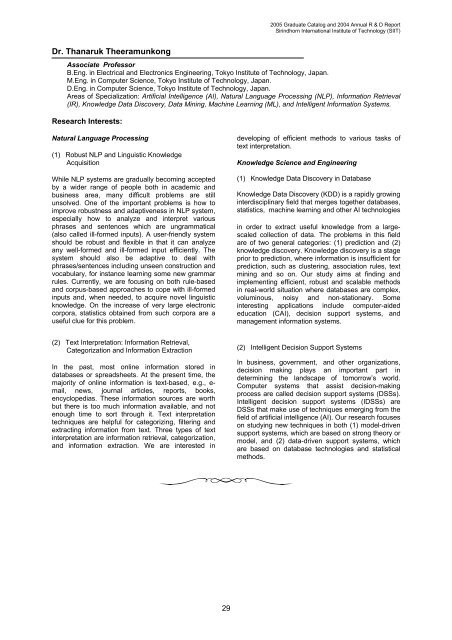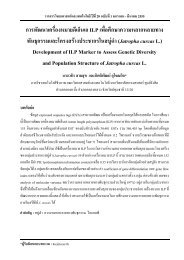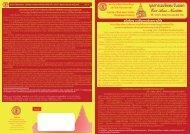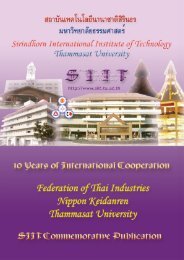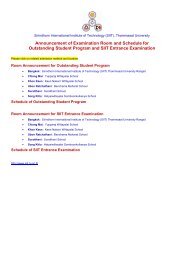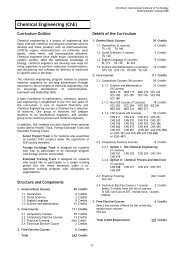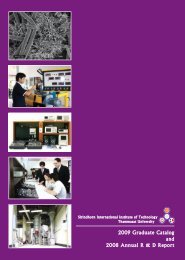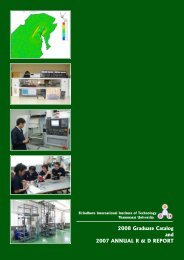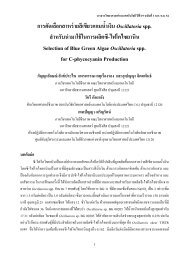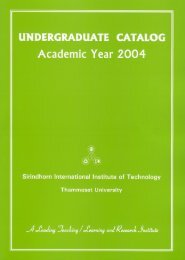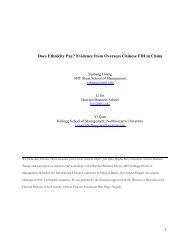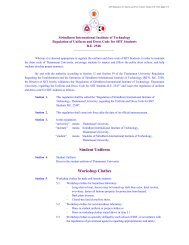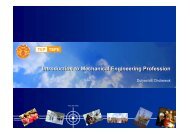2005 Graduate Catalog and 2004 Annual R & D Report - Sirindhorn ...
2005 Graduate Catalog and 2004 Annual R & D Report - Sirindhorn ...
2005 Graduate Catalog and 2004 Annual R & D Report - Sirindhorn ...
- No tags were found...
You also want an ePaper? Increase the reach of your titles
YUMPU automatically turns print PDFs into web optimized ePapers that Google loves.
<strong>2005</strong> <strong>Graduate</strong> <strong>Catalog</strong> <strong>and</strong> <strong>2004</strong> <strong>Annual</strong> R & D <strong>Report</strong><br />
<strong>Sirindhorn</strong> International Institute of Technology (SIIT)<br />
Dr. Thanaruk Theeramunkong<br />
Associate Professor<br />
B.Eng. in Electrical <strong>and</strong> Electronics Engineering, Tokyo Institute of Technology, Japan.<br />
M.Eng. in Computer Science, Tokyo Institute of Technology, Japan.<br />
D.Eng. in Computer Science, Tokyo Institute of Technology, Japan.<br />
Areas of Specialization: Artificial Intelligence (AI), Natural Language Processing (NLP), Information Retrieval<br />
(IR), Knowledge Data Discovery, Data Mining, Machine Learning (ML), <strong>and</strong> Intelligent Information Systems.<br />
Research Interests:<br />
Natural Language Processing<br />
(1) Robust NLP <strong>and</strong> Linguistic Knowledge<br />
Acquisition<br />
While NLP systems are gradually becoming accepted<br />
by a wider range of people both in academic <strong>and</strong><br />
business area, many difficult problems are still<br />
unsolved. One of the important problems is how to<br />
improve robustness <strong>and</strong> adaptiveness in NLP system,<br />
especially how to analyze <strong>and</strong> interpret various<br />
phrases <strong>and</strong> sentences which are ungrammatical<br />
(also called ill-formed inputs). A user-friendly system<br />
should be robust <strong>and</strong> flexible in that it can analyze<br />
any well-formed <strong>and</strong> ill-formed input efficiently. The<br />
system should also be adaptive to deal with<br />
phrases/sentences including unseen construction <strong>and</strong><br />
vocabulary, for instance learning some new grammar<br />
rules. Currently, we are focusing on both rule-based<br />
<strong>and</strong> corpus-based approaches to cope with ill-formed<br />
inputs <strong>and</strong>, when needed, to acquire novel linguistic<br />
knowledge. On the increase of very large electronic<br />
corpora, statistics obtained from such corpora are a<br />
useful clue for this problem.<br />
developing of efficient methods to various tasks of<br />
text interpretation.<br />
Knowledge Science <strong>and</strong> Engineering<br />
(1) Knowledge Data Discovery in Database<br />
Knowledge Data Discovery (KDD) is a rapidly growing<br />
interdisciplinary field that merges together databases,<br />
statistics, machine learning <strong>and</strong> other AI technologies<br />
in order to extract useful knowledge from a largescaled<br />
collection of data. The problems in this field<br />
are of two general categories: (1) prediction <strong>and</strong> (2)<br />
knowledge discovery. Knowledge discovery is a stage<br />
prior to prediction, where information is insufficient for<br />
prediction, such as clustering, association rules, text<br />
mining <strong>and</strong> so on. Our study aims at finding <strong>and</strong><br />
implementing efficient, robust <strong>and</strong> scalable methods<br />
in real-world situation where databases are complex,<br />
voluminous, noisy <strong>and</strong> non-stationary. Some<br />
interesting applications include computer-aided<br />
education (CAI), decision support systems, <strong>and</strong><br />
management information systems.<br />
(2) Text Interpretation: Information Retrieval,<br />
Categorization <strong>and</strong> Information Extraction<br />
In the past, most online information stored in<br />
databases or spreadsheets. At the present time, the<br />
majority of online information is text-based, e.g., e-<br />
mail, news, journal articles, reports, books,<br />
encyclopedias. These information sources are worth<br />
but there is too much information available, <strong>and</strong> not<br />
enough time to sort through it. Text interpretation<br />
techniques are helpful for categorizing, filtering <strong>and</strong><br />
extracting information from text. Three types of text<br />
interpretation are information retrieval, categorization,<br />
<strong>and</strong> information extraction. We are interested in<br />
(2) Intelligent Decision Support Systems<br />
In business, government, <strong>and</strong> other organizations,<br />
decision making plays an important part in<br />
determining the l<strong>and</strong>scape of tomorrow’s world.<br />
Computer systems that assist decision-making<br />
process are called decision support systems (DSSs).<br />
Intelligent decision support systems (IDSSs) are<br />
DSSs that make use of techniques emerging from the<br />
field of artificial intelligence (AI). Our research focuses<br />
on studying new techniques in both (1) model-driven<br />
support systems, which are based on strong theory or<br />
model, <strong>and</strong> (2) data-driven support systems, which<br />
are based on database technologies <strong>and</strong> statistical<br />
methods.<br />
29


